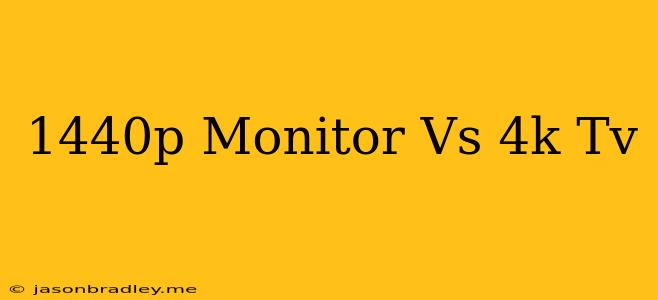1440p Monitor vs 4K TV: Which is Right for You?
Choosing between a 1440p monitor and a 4K TV can be a tough decision, especially when considering factors like price, performance, and intended use. Both offer their own advantages and disadvantages, so it's important to weigh your needs and budget carefully.
1440p Monitor: Advantages
- High Resolution: 1440p (2560 x 1440 pixels) offers a significant jump in resolution compared to 1080p, delivering sharper visuals and more detail.
- Lower Price: 1440p monitors tend to be more affordable than 4K TVs of similar sizes.
- Faster Refresh Rates: 1440p monitors often boast higher refresh rates, crucial for gaming and other demanding tasks.
- Smaller Size: Most 1440p monitors are smaller than 4K TVs, which is ideal for desktop setups and gamers who prioritize screen real estate.
1440p Monitor: Disadvantages
- Less Sharpness than 4K: While sharper than 1080p, 1440p still falls short of the pixel density offered by 4K.
- Limited Availability of 4K Content: While 1440p content is becoming more readily available, 4K content still dominates the streaming and gaming landscape.
4K TV: Advantages
- Ultra-High Resolution: 4K (3840 x 2160 pixels) boasts incredible clarity and detail, providing an immersive viewing experience for movies, games, and TV shows.
- Wider Availability of 4K Content: Streaming services and gaming platforms offer a plethora of 4K content, allowing you to enjoy its full potential.
- Larger Screen Sizes: 4K TVs come in larger sizes, ideal for home theater setups and multimedia enjoyment.
- HDR Support: Many 4K TVs support HDR (High Dynamic Range), delivering wider color gamuts and increased contrast for a more realistic viewing experience.
4K TV: Disadvantages
- Higher Price: 4K TVs are generally more expensive than 1440p monitors of similar sizes.
- Slower Refresh Rates: While some 4K TVs offer high refresh rates, they often lag behind 1440p monitors in this area.
- Larger Size: 4K TVs can be bulky and take up more space, making them less suitable for smaller desks or rooms.
Conclusion
Ultimately, the choice between a 1440p monitor and a 4K TV depends on your individual needs and preferences. If you're a gamer prioritizing high refresh rates and responsiveness, a 1440p monitor might be the better choice. But if you're looking for the ultimate visual experience and want to immerse yourself in high-resolution content, a 4K TV is likely the way to go.
Remember to consider:
- Your Budget: 4K TVs are often pricier than 1440p monitors, but prices are steadily decreasing.
- Your Use Case: Gaming, movies, or general use will influence your choice.
- Screen Size: Consider your available space and intended use.
- Refresh Rate: For gamers, a high refresh rate is crucial for smooth gameplay.
- HDR Support: HDR enhances the viewing experience and is particularly beneficial for 4K TVs.
By carefully weighing these factors, you can make an informed decision and choose the display that best suits your needs and budget.
